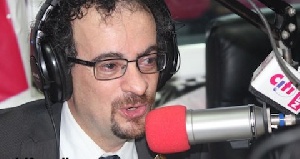 Jon Benjamin, British High Commissioner to Ghana
Jon Benjamin, British High Commissioner to Ghana
Oil rich nations often do not benefit enough from their natural resources to fund development and fight poverty mainly due to lack of transparency, Mr. Jon Benjamin, British High Commissioner, has said.
“Transparency helps, but it is not much use without a well-informed civil society which is a key support to greater accountability for policy decisions, contract awards, and the use to which revenue from oil is put,” he said.
Mr. Benjamin was speaking in Accra at the official launch of the Ghana Oil and Gas for Inclusive Growth (GOGIG) programme, setup to help ensure that the oil and gas sector promotes inclusive growth.
The GOGIG programme has been launched to support the institutions which manage the country’s oil resources to deliver on effective public policy through strengthening regulation of the sector and improving revenue capture to maximise the direct benefits from the oil and gas sector.
Other objectives include improving revenue management to ensure transparency and avoid adverse macroeconomic consequences associated with natural resources windfall gains and enhancing sector oversight to hold government accountable.
Mr. Benjamin explained that even with low oil prices in the global market, there are opportunities for inclusive growth from natural resources, adding that a casual look at oil-rich countries around the world showed that just having oil is no basis for sustained, inclusive growth.
He urged civil society groups to demand accountability and probe about the governance of the natural resources, such as award of contracts and the lifestyle of officials tasked with the management of the natural resources.
“Laws on their own are not enough: if they are enacted but never implemented, or flouted and ignored with impunity, they might as well have never happened,” he stated
Mr. Benjamin said just as accountability is critical for good governance, it is equally vital that government is supported in its efforts to complete the policy framework, with the contributions to capacity-building it needs to do a good job on behalf of the people.
The objectives of GOGIG that include strengthened regulation; improved revenue capture; improved revenue management and enhanced sector oversight are tough but critical for making the most of oil and gas, he said.
“We believe that the financial resources the UK has committed to support Ghana through the work of GOGIG – on behalf of British taxpayers – constitute an investment in the future of Ghana, and in a better future for Ghana.”
He said the return on the investment hinges on the efforts of GOGIG, but more on the clear commitment of the government to make the most of oil and gas, and on the strength of the people of Ghana in holding the government to account to ensure that the country’s natural resources secure the greatest possible social and economic benefit for all its people.
Ms. Adelaide Addo-Fening, Team Leader, GOGIG, in a media interaction after the launch explained that the programme has been designed to support the development of technical capability within government, and also to support the improved accountability which is necessary to provide incentives for institutions to sustain good governance.
“We work in a very responsive manner so the partnership with the state institutions is very key so some of those state institutions are the Ghana Revenue Authority, Bank of Ghana, Ministry of Finance and what our role is to sit with them for discussion to understand their capacity requirement, to understand which priorities that GOGIG is best close to support them with and our support,” she said.
Mr. Alex Kyei, GOGIG Steering Committee member confirmed that the programme is made possible through funding from the UK Department for International Development and will run from 2015 until 2019.
He indicated that the country has moved from the discovery of oil and gas to production in a relatively short time and that progress has been made in building capacity of the key state institutions responsible for governing the sector and developing the framework of law and policy for managing oil and gas resources.
He however explained that, gaps remain-the legislative framework is incomplete and there is need to further develop the capacity of the key institutions. This is necessary if the expected benefits of oil and gas are going to materialize.
“A key innovation of GOGIG is that the programme is not tied to a pre-determined work plan, instead, it has been designed to be flexible and able to respond to emerging priorities and opportunities and that allows us to maintain relevance,” he said.